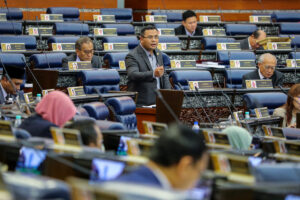By Amar Shah Mohsen
KUALA LUMPUR, Oct 26 — Increasing the overnight policy rate (OPR) can address the ringgit’s depreciation, but comes at the expense of rising living costs.
Menteri Besar Dato’ Seri Amirudin Shari said this in defence of the Federal government amid a weakening ringgit yet to show any improvement signs.
Debating the Budget 2024 today, the Gombak MP said while Putrajaya could have easily adopted a similar approach to countries like the United States (US) in hiking the OPR, this would not have been socially responsible, considering the already exorbitant living costs.

The US OPR is currently at 5.5 per cent and has been consistently above the five per cent rate since March. In contrast, Malaysia’s OPR is at three per cent.
“This means investors are more likely to invest in countries with higher interest rates. However, the government also has to consider that increasing the OPR to strengthen the ringgit will also lead to an increase in the prices of goods.
“As such, there needs to be social responsibility and balance. This ensures that prices can be maintained, while simultaneously strategies can be taken to address the ringgit drop and lack of investments,” he said in Parliament.
However, Amirudin added he is not in a position to answer about the government’s strategies to strengthen the currency, and Prime Minister Datuk Seri Anwar Ibrahim can best answer as he is also the Finance Minister.
He was responding to Tanjong Kerang MP Zulkafperi Hanapi’s query on his view of the ringgit slump in recent weeks.
Amirudin said that during a recent town hall session with Investment, Trade, and Industry Minister Tengku Datuk Seri Zafrul Tengku Abdul Aziz, the latter also assured that while the ringgit has depreciated, Malaysia’s foundation remains strong.
“Our economic growth continues to be positive. In other words, the ringgit drop has not disrupted our foundation,” he said.
Separately, Amirudin stressed the importance of proper coordination at all levels to provide more higher-paying jobs and ensure better job matching for Malaysians, particularly in the technical and vocational fields.
This is crucial for better overall salaries, in line with the New Industrial Master Plan (NIMP) 2030’s median salary target of RM4,510 by 2030.
Based on the Statistics Department’s Income Survey Report 2022, there is currently a massive salary gap nationwide, with only 11.5 per cent of households earning RM16,000 and above.
“This means 89.5 per cent of families have salaries lower than that. Of this percentage, nearly 40 per cent of households earn under RM5,000 monthly.
“This clearly shows one of Malaysians’ leading anxiety causes is the perception the economy is sidelining them and not offering dignified opportunities to improve their quality of life.
“While we have achieved what can be considered full employment at a three per cent unemployment rate, we are still unable to resolve the issue of quality jobs offering higher and more reasonable wages,” he said.





